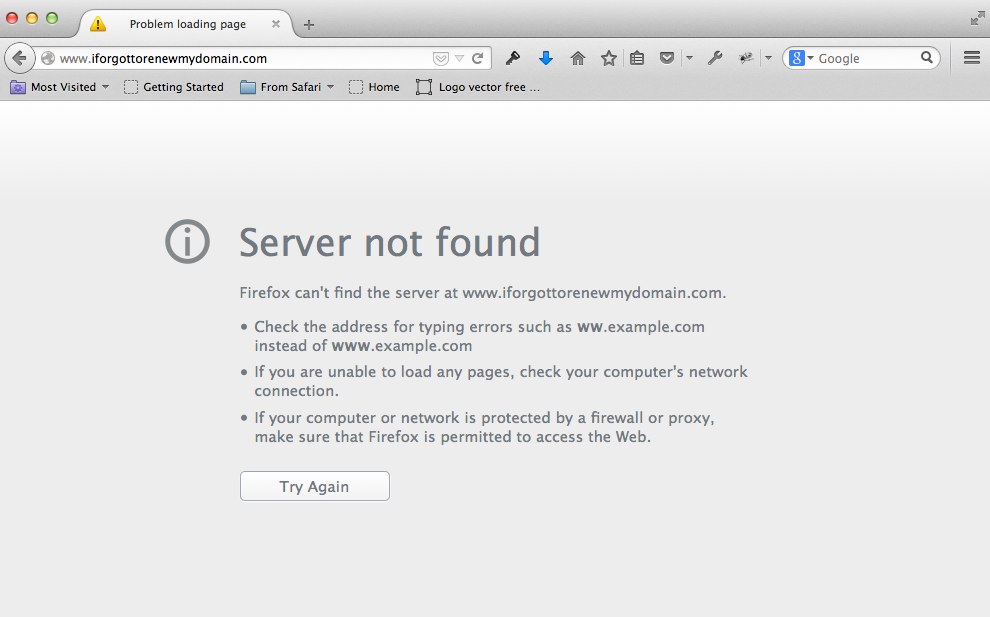One thing I stress heavily to my web design clients is the importance of maintaining and renewing their domain name when it comes up for yearly renewal. All too often people forget to take care of this and then spend a lot of time and money trying to fix it, many times never being able to come out satisfied with the outcome.
Picture the following scenario, which I have seen happen all to often to people. You spend a lot time coming up with the perfect domain name for your business, and then develop a website based around it. You go through the painstaking process of getting the perfect website up and running, then one day you log onto your site and it is gone! It may have been replaced by a generic page, a server not found page, or a page that says the domain is “for sale,” or even worse, it has been taken over and replaced by somebody else’s content altogether – maybe even a competitor’s!
 Your first thought might be, “OMG – I have been hacked!” But, more often than not, the sad truth is you, or the person maintaining your web presence, if it is part of your contract with them, probably let your domain name expire.
Your first thought might be, “OMG – I have been hacked!” But, more often than not, the sad truth is you, or the person maintaining your web presence, if it is part of your contract with them, probably let your domain name expire.
Domain names and web hosting are two separate entities, that work together. Just because you purchase hosting services from someone, it does not automatically mean they are in charge of renewing your domain name for you.
Web Hosting Fees vs. Domain Name Fees
Web hosting is where the files that drive your website have a presence. You don’t necessarily need a domain name to have your files hosted online. Hosting services are generally billed on a monthly or quarterly basis by your hosting provider.
Domain names, however, are purchased from a domain name registrar, that is authorized to sell them through the Internet Corporation for Assigned Names and Numbers (ICANN). Sometimes you may purchase a domain name through your hosting provider, as part of your start up hosting package, when you launch a new site. But, the name must be renewed every year in order for you to maintain ownership of it. When that year rolls around, if your hosting provided doesn’t explicitly say they renew it for you, it is up to you to make sure the domain gets paid for and renewed on time.
My web design clients usually do their hosting through me, and I purchase and maintain their domain names for them, making sure they are renewed every year. But, not all web developers or internet hosting services offer the same level of service. Always make sure you know exactly who handles the renewal, so you don’t fall victim to losing it. Otherwise, you may be in for a nasty surprise!
What Happens If You Forgot To Renew Your Domain
Your domain name will be “turned off.” This means it gets disabled and people who type in “www.yourdomain.com” will not longer see your website. Your website is still there, quietly residing on your hosting company’s servers, but there is no easy-to-remember domain name to direct people to it anymore. In effect, it looks like your website is gone!
The domain many now have also migrated to a page that shows that the domain name is “for sale.” From the time your domain is turned off to the time it shows it is available for purchase it can be as a little as a few minutes to up to 48 hours. This is all dependent on how quickly a DNS update is done.
Some hosting providers, or even individuals who make a living doing this, will even snap up expired domains immediately upon expiration so that they can sell them at premium prices to someone else, or back to you again at an inflated price. You forgot to renew it and they are banking on the fact that you will want it back. There is no “grace period” on an expired domain. The minute it becomes available, it can be sold to anyone.
And, once this happens, there is frankly no way to get it back again, unless you purchase it at whatever rate the person who bought it wants to sell it to you at. There are no laws governing this. Sure, you could take your chances and hire a lawyer to take someone to court, if you feel they are squatting on your name and trying to extort money out of you, but this will end up costing you a lot of time, money and frustration, and in the meantime your website is still down and you have no guarantee of winning the case.
I have seen people, sadly, be put in this position, and they ended up paying the person who purchased their domain hundreds, and even thousands, of dollars, for something that would have cost them less than $20 had they renewed on time.
How Do You Make Sure This Doesn’t Happen To You
It’s so much simpler to make sure your domain is set to “auto renew” with your registrar, if you are controlling it, or to check with your web developer and/or hosting company to make sure they auto renew it for you if they are taking care of it. All of my clients’ domains are set to auto renew every single year, so we don’t run into this situation.
If you handle the purchase of your domain yourself, here are some tips to make sure you don’t miss your renewal deadline:
Skip the bargain domain registry companies.
Too often people will have one domain at Network Solutions, one at GoDaddy, another at Namecheap, and so on. They do this to get the “best deal” on a new domain, but keep in mind these deals will change to “true” pricing when it renews. I recently had a client who got a 99¢ domain deal last year from a registrar, but when it went to renew this year the price had skyrocketed to $35! He would have been much better off finding a registrar that has a “true” yearly price of anywhere from $10 to $20 for a domain name and registered it there. He also has several domains spread across different companies, which makes it hard to manage them all.
Use only one domain registrar.
This is especially important is you have multiple domain names you manage, including variations on your main one. Having one place to check for renewals makes life so much easier. So pick a registrar and use them for all of your domains.
Keep your domain record up to date.
Domain registrars will send you a renewal notification, before your domain is set to expire, but they can only reach you if your contact information is up to date and the email they send doesn’t end up in your SPAM folder. You can check the accuracy of your name and its expiration date by doing a WHOIS search. This will provide you with an online directory of publicly available information on domain names, including who owns them and their most recent contact information. Make sure yours is up to date, and if it’s not, make it so. Go to http://www.networksolutions.com/whois/ to check your information.
Register your domain name for a longer period of time.
You don’t have to register a name for just one year, you can also register it for two, five, or even ten years, if you prefer.
Set up auto-renew in your domain name control panel.
In the end, this is a small price to pay for piece of mind, knowing you won’t lose your precious name.
Mark you calendar to remind you to renew.
This is an easy way to remind yourself your name is coming up for renewal. Be sure to make it 30 days in advance of the expiration date. This is also a great backup system in case your registrar’s renewal emails don’t get to you for some reason.
If you forget to renew your domain, don’t feel bad, you are in good company. So have the Dallas Cowboys, Foursquare and Sony!
domain name renewals, domain names, domains
- Google Shakes Up Digital World: Free Website Service No More! - January 8, 2024
- Unleashing the Power of Storyboarding: A Practical Guide to Designing Outstanding Websites - September 20, 2023
- Why Your Business Needs a Professional Web Consultant: A Comprehensive Guide - September 5, 2023




